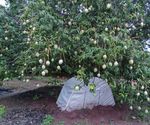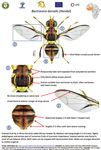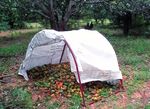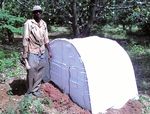Support Project to the Regional Plan for Fruit Flies Monitoring and Control in West Africa
←
→
Page content transcription
If your browser does not render page correctly, please read the page content below
FFCP Newsletter - N°03 APRIL 2018
Support Project to the Regional Plan for Fruit Flies
Monitoring and Control in West Africa
... For a better quality and profitability
of the fruits of our orchards ... FFCP news
Guinea Bissau and Nigeria fully integrated to the FFPC
Guinea Bissau and Nigeria have signed the partnership
agreements with ECOWAS and are by now fully integrated
to the FFCP. The payment of the grant is underway for the
implementation of their 2017-2018 actions plans.
Starting of the export campaign
The first surveillance alert announcing the opening of the
2017-2018 mango export campaign took place during the
second week of March 2018 for Burkina Faso, Benin, Ghana,
Côte d’Ivoire, Guinée and Mali. The mango campaign for
Senegal and Gambia should start later, in June.
FFCP: financial commitment of 96%
The mid-year report of August 19th 2017 to February 18th
2018 has been prepared. The financial analysis of the project
editorial implementation level shows a financial commitment of 96%.
Considering this performance, in the absence of additional
funds and with the integration of new countries (Togo, Guinea
Bissau and Nigeria), the Coordination Unit has proposed a
review of the countries’ work plans and regional work plans
Dear colleagues and partners. This is your FFCP quarterly focusing on the key activities of control and monitoring, since
Newsletter N°3 for the period of January to March 2018. capacity building activities have already been undertaken
under regional work plan.
Two major events have marked the last three months of
the FFCP. The first event is related to the full and effective A temporary suspension of the country workplan
integration of Nigeria and Guinea Bissau to the FFCP through implementation has been required in order to allow the time
the signature of the partnership agreements with ECOWAS of consultation with all of the stakeholders.
and the payment of the grant for the implementation of their
action plans. Mango interceptions diagnostics: an essential tool
The second event is the elaboration of the consolidated semi- The diagnostic studies of mango interceptions realized in
annual report August 19th 2017 – to February 18th 2018 of 2017 have been finalized and the study reports restitution
the FFCP . This period was an opportunity for the Coordination concluded in 4 of the 5 countries concerned (Senegal, Côte
Unit (CU) to review the national action plans and the regional
d’Ivoire, Burkina and Guinea). These diagnoses stress on the
work plan in light of the available funds and the integration of
the three new members. weaknesses of the official certification system in the countries
and proposed an action plan for their improvement. These
As a consequence, we will have to reduce a bit the scope studies also revealed unusual facts. For example, in Mali the
of planned activities and focus on key actions including diagnosis pointed out the fact that out of 53 inspectors trained
monitoring, strengthening of official controls and the training in 2017 with the support of the FFCP and other partners, only
of operators on post-harvest. 16 were assigned to the mango inspections in 2017, the others
Finally, during this period, the monitoring system launched replaced by new officers who have never received training to
the alert for the start of the mango export campaign for conduct the certification. The CU challenges OPV taking action
Burkina Faso, Benin, Ghana, Côte d’Ivoire, Guinea and Mali. on their responsibilities.
Nata Traoré, FFCP Coordinatorour achievements
Monitoring component
F rom February 19 to 23 2018, a training workshop was
held in Banjul (The Gambia) for the Super Users of the
Monitoring/Alert System of the ECOWAS FFCP. This workshop
training sesssion in the use of data base and alert
system - Banjul - Gambia, 13 - 23 February 2018
is part of the technical capacity building on data management
and analysis with the use of the Project decision support
system on phytosanitary integrated approach. The Alert
system generates information that, depending on the type of Participants successfully followed data analysis provided
agricultural company, sends an alert to the operators. Sixteen by the regional surveillance network and issued 80 warning
(16) members of National committees from eight (08) member messages to producers and national technical managers in the
countries attended the meeting. countries concerned at the end of the workshop.
Capacity Building
component
Training of technicians on fruit fly
taxonomy diagnostic laboratories, held
T he activities carried out by the Capacity Building component in Bobo-Dioulasso/in Burkina Faso, from
can be summed up in the organization of regional trainings, 12 to 17 February 2018
support to the national committees for the organization of
national trainings and elaboration of the management manual
of the phytosanitary intervention brigades.
The regional trainings were organized in collaboration with
the national committees of the host countries, as follows:
• The regional training workshop for technicians of fruit fly
taxonomy diagnostic laboratories, held in Bobo-Dioulasso/in
Burkina Faso, from 12 to 17 February 2018
• The regional training workshop on the use of data base, data
analysis by the decision support system, and on the alert system,
held in Banjul/The Gambia, from 19 to 23 February 2018
• The regional training workshop for phytosanitary inspectors on
sampling techniques, held in Koudougou/Burkina Faso, from 19
to 23 February 2018, and
• The regional training on harmonization of pilot orchards
management, held in Sikasso/Mali, from February, 26th to March
2nd, 2018.
Control Component
D uring the last quarter, the main activities of the control
component consisted of the setting up of integrated
control in Ivory Coast and in Gambia and the organization of a
training workshop on the monitoring of pilot orchards.
Learners in an exercise
of observation
Learners discussing face to face with
farmers in an orchard schoolApplied Research component Coordination
R esearch in Côte d’Ivoire has shown the impact of climate
change on the fruit fly population. In fact, the study of the
relative density of flies in the different agroecological zones
T he Coordinator has taken part to a trip exchange in South
Africa at the invitation of River Biosciences and Citrus
Research International (CRI) two organisations of the Citrus
showed a decrease from August 2017 to January 2018. The fly Group Association South African through their partner
species Bactrocera dorsalis and Ceratitis cosyra were present in SAVANA in West Africa.
the orchards during this period. This study showed that these
From this visit the following lessons were learned:
two species began to adapt to climatic variations (temperature
and relative humidity) which are not good for them. • The fruits flies monitoring leading to control activities is a
requirement for an effective control. Producers of the same basin
must discipline themselves in order to undertake control actions
and these actions should be integrated (sanitation combined
with the use of control products) and triggered at the same time
by all from a threshold of the fruit flies infestation set up by the
actors. The operation of the mechanism by the actors is essential
for the sustainability of the fruit flies control.
• The financial contribution through tax payment based on the
quantity of the mango produced and exported by the actors
(producers and exporters) with the set-up of a transparent
management mechanism is necessary for a sustainably control
and monitoring system for the fruit flies.
• The applied research is necessary for an effective control of the
fruit flies. But the agenda of this applied research should be built
upon the needs and constraints of the actors of the mango value
chain and not the opposite. This is particularly justified if the
actors contribute to the financing of the research activities.
• Finally, to reduce the interceptions, the self-control of the
exporters themselves is crucial.
Discussion with South African farmers on control
actions against fruit flies
Density of fruit fly populations in ECOWAS
zones on April 13, 2018 (issued by the
monitoring system)News of the
neighbouring countrY
In Burkina Faso, nearly 90% of fruit fly attacks on mango are due to Bactrocera
burkina faso
dorsalis and Ceratitis cosyra, which are the two dominant species. There
are native and exotic parasitoids in the environment (Fopius arisanus,
Diachasmimorpha longicaudata, Psyttalia fletcheri, etc.), which are organisms
that develop on or inside one of the stages of fruit flies (eggs, larvae ,pupae)
and kill them, contributing to the reduction of fruit flies populations. The
use of augmentorium, a tent-like device promotes their multiplication. The
augmentarium is be made up of sheet or other local material, mosquito net
with appropriate mesh, and has an opening that can be sealed (the mostiquo Installing the augmentorium
net let parasitoids escape while trapping fruit flies).
Principle of operation
It is advisable to place the augmentarium under mango tree shade. Infested
fruits are collected and deposited in the augmentorium. At the termination of
their life cycle, all the flies that emerge in the augmentorium will be sequestrated
while the parasitoids that emerge from parasitized fruit flies escape throught
the mesh to re-infest other fruits flies. This device, used in pilot / orchard school,
reinforce the strategy of integrated management of fruit fly populations.
Benin
Burkina Faso
Côte d’Ivoire
Gambie
Ghana
Guinea ECOWAS Commission
Bissau Guinea and its member
Mali
Nigeria
States are involved
Senegal and join forces to
Togo
Cap-Vert
control fruit flies
Liberia infestation and to
Introduction of mangoes collected in the augmentorium Niger increase the fruit and
Sierra Leone
vegetables producers’
in euros incomes
Financial Report Disbursement Engagement
(in millions €)
Monitoring 1.684.361
4.127.622
Control 2.738.899
3.943.286
Capacity Building 2.475.057
3.536.913
Applied Research 917.331
1.780.150
Coordination 1.635.754
2.853.786
AFD Fees 423.077
642.307
Yearly Disbursement Trend 6
partners
5
in millions €
4
3
2
1
implemented by
Ingénieur Conseils
Euros / Category / Year Year 1 Year 2 Year 3 Year 4
Under the supervision of
AFD Fees 100.000 € 157.692 € 165.385 €
the Regional Agency for Agriculture and Food (ARAA)
Coordination 301.358 € 577.083 € 565.191 € 228.004 € Lomé, Togo - Tel. +228 22 21 40 03
araa@araa.org - www.araa.org
Applied Research 56 € 327.087 € 326.029 € 278.886 €
Capacity Building 129.917 € 636.448 € 1 227.359 € 689.935 €
FFCP Coordination Unit
contact
Control 91.870 € 507.959 € 2.149.083 € 786.574 €
Bamako, Mali - Tel. +223 20 21 13 34
Monitoring 88.519 € 367.741 € 929.950 € 341.481 €
coordination.plmf@sogerom.comYou can also read



























































